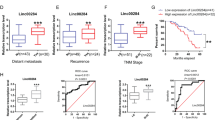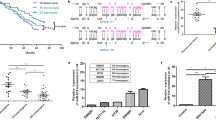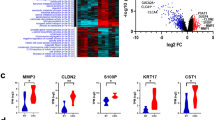Abstract
Aim:
To investigate the regulatory effect of microRNA-221 (miR-221) on CDKN1C/p57 expression in colorectal carcinoma (CRC).
Methods:
Thirty four CRC and adjacent non-tumorous tissue samples were collected individually. Total RNA and protein were isolatedand from these samples and four human CRC-derived cell lines (including HT-29, Lovo, SW-480 and Caco2). MiR-221 expression was examined using real-time RT-PCR. CRC cells were treated with or without anti-p57-siRNA prior to the addition of pre-miR-221 or anti-miR-221. The mRNA and protein levels of CDKN1C/p57 were examined using semi-quantitative RT-PCR and Western blot, respectively. CRC cell proliferation and apoptosis were assessed using MTT assay and flow cytometry, respectively. The CDKN1C/p57 3′-UTR fragment was amplified using PCR from the genomic DNA of human colon cells and inserted into a luciferase reporter construct. The reporter construct was then transfected into CRC cells together with pre-miR-221 or anti-miR-221, and the luciferase activity in the transfected cells was examined.
Results:
MiR-221 expression was significantly up-regulated in 90% of CRC samples compared to that in the adjacent non-tumorous tissue, and the expression level was positively correlated to an advanced TNM stage and local invasion. There was no significant difference in CDKN1C/p57 mRNA expression between CRC and corresponding non-tumorous tissues, whereas CDKN1C/p57 protein expression was markedly decreased in the CRC samples. A significant inverse correlation between miR-221 and CDKN1C/p57 expression was found in CRC cells. Moreover, a miR-221-specific inhibitor significantly increased CDKN1C/p57 protein expression in CRC cells. Anti-miR-221 markedly inhibited CRC cell proliferation and induced apoptosis. This inhibitory effect was abolished by pretreatment with anti-p57-siRNA, suggesting that the inhibition was mediated by CDKN1C/p57. A significant increase of the luciferase activity was observed in CRC cells co-transfected with the luciferase reporter construct and anti-miR-221.
Conclusion:
MiR-221 binds to the target site in the 3′-UTR of the CDKN1C/p57 mRNA to inhibit CDKN1C/p57 expression by post-transcriptional gene silencing to promote CRC occurrence and progress, therefore serving as a potential therapeutic target for the prevention and treatment of CRC.
Similar content being viewed by others
Log in or create a free account to read this content
Gain free access to this article, as well as selected content from this journal and more on nature.com
or
References
Motoyama K, Inoue H, Takatsuno Y, Tanaka F, Mimori K, Uetake H, et al. Over- and under-expressed microRNAs in human colorectal cancer. Int J Oncol 2009; 34: 1069–75.
Wang CJ, Zhou ZG, Wang L, Yang L, Zhou B, Gu J, et al. Clinicopathological significance of microRNA-31, -143 and -145 expression in colorectal cancer. Dis Markers 2009; 26: 27–34.
Yantiss RK, Goodarzi M, Zhou XK, Rennert H, Pirog EC, Banner BF, et al. Clinical, pathologic, and molecular features of early-onset colorectal carcinoma. Am J Surg Pathol 2009; 33: 572–82.
Guarnieri DJ, DiLeone RJ . MicroRNAs: a new class of gene regulators. Ann Med 2008; 40: 197–208.
Cheng HY, Obrietan K . Revealing a role of microRNAs in the regulation of the biological clock. Cell Cycle 2007; 6: 3034–5.
La Rocca G, Badin M, Shi B, Xu SQ, Deangelis T, Sepp-Lorenzinoi L, et al. Mechanism of growth inhibition by MicroRNA 145: the role of the IGF-I receptor signaling pathway. J Cell Physiol 2009; 220: 485–91.
Shin S, Cha HJ, Lee EM, Jung JH, Lee SJ, Park IC, et al. MicroRNAs are significantly influenced by p53 and radiation in HCT116 human colon carcinoma cells. Int J Oncol 2009; 34: 1645–52.
Yamamichi N, Shimomura R, Inada K, Sakurai K, Haraguchi T, Ozaki Y, et al. Locked nucleic acid in situ hybridization analysis of miR-21 expression during colorectal cancer development. Clin Cancer Res 2009; 15: 4009–16.
Fornari F, Gramantieri L, Ferracin M, Veronese A, Sabbioni S, Calin GA, et al. MiR-221 controls CDKN1C/p57 and CDKN1B/p27 expression in human hepatocellular carcinoma. Oncogene 2008; 27: 5651–61.
Diaz-Meyer N, Day CD, Khatod K, Maher ER, Cooper W, Reik W, et al. Silencing of CDKN1C(p57/KIP2) is associated with hypomethylation at KvDMR1 in Beckwith-Widemann syndrome. J Med Genet 2003; 40: 797–801.
Vlachos P, Joseph B . The Cdk inhibitor p57(Kip2) controls LIM-kinase 1 activity and regulates actin cytoskeleton dynamics. Oncogene 2009; 28: 4175–88.
Bartels CL, Tsongalis GJ . MicroRNAs: novel biomarkers for human cancer. Clin Chem 2009; 55: 623–31.
Sun K, Wang Q, Huang XH . PPAR gamma inhibits growth of rat hepatic stellate cells and TGF beta-induced connective tissue growth factor expression. Acta Pharmacol Sin 2006; 27: 715–23.
Mirnezami AH, Pickard K, Zhang L, Primrose JN, Packham G . MicroRNAs: key players in carcinogenesis and novel therapeutic targets. Eur J Surg Oncol 2009; 35: 339–47.
Baffa R, Fassan M, Volinia S, O'Hara B, Liu CG, Palazzo JP, et al. MicroRNA expression profiling of human metastatic cancers identifies cancer gene targets. J Pathol 2009; 219: 214–21.
Schetter AJ, Harris CC . Plasma microRNAs: a potential biomarker for colorectal cancer? Gut 2009; 58: 1318–9.
Ahmed FE, Jeffries CD, Vos PW, Flake G, Nuovo GJ, Sinar DR, et al. Diagnostic microRNA markers for screening sporadic human colon cancer and active ulcerative colitis in stool and tissue. Cancer Genomics Proteomics 2009; 6: 281–95.
Glinskii AB, Ma J, Ma S, Grant D, Lim CU, Sell S, et al. Identification of intergenic trans-regulatory RNAs containing a disease-linked SNP sequence and targeting cell cycle progression/differentiation pathways in multiple common human disorders. Cell Cycle 2009; 8: 3925–42.
Matsuoka S, Edwards MC, Bai C, Parker S, Zhang P, Baldini A, et al. p57KIP2, a structurally distinct member of the p21CIP1 Cdk inhibitor family, is a candidate tumor suppressor gene. Genes Dev 1995; 9: 650–62.
Soejima H, Nakagawachi T, Zhao W, Higashimoto K, Urano T, Matsukura S, et al. Silencing of imprinted CDKN1C gene expression is associated with loss of CpG and histone H3 lysine 9 methylation at DMR-LIT1 in esophageal cancer. Oncogene 2004; 23: 4380–8.
Galardi S, Mercatelli N, Giorda E, Massalini S, Frajese GV, Ciafrè SA, et al. MiR-221 and miR-222 expression affects the proliferation potential of human prostate carcinoma cell lines by targeting p27Kip1. J Biol Chem 2007; 282: 23716–24.
Felli N, Fontana L, Pelosi E, Botta R, Bonci D, Facchiano F, et al. MicroRNAs 221 and 222 inhibit normal erythropoiesis and erythroleukemic cell growth via kit receptor down-modulation. Proc Natl Acad Sci USA 2005; 102: 18081–6.
Le Sage C, Nagel R, Egan DA, Schrier M, Mesman E, Mangiola A, et al. Regulation of the p27(Kip1) tumor suppressor by miR-221 and miR-222 promotes cancer cell proliferation. EMBO J 2007; 26: 3699–708.
Visone R, Russo L, Pallante P, De Martino I, Ferraro A, Leone V, et al. MicroRNAs (miR)-221 and miR-222, both overexpressed in human thyroid papillary carcinomas, regulate p27Kip1 protein levels and cell cycle. Endocr Relat Cancer 2007; 14: 791–8.
He H, Jazdzewski K, Li W, Liyanarachchi S, Nagy R, Volinia S, et al. The role of microRNA genes in papillary thyroid carcinoma. Proc Natl Acad Sci USA 2005; 102: 19075–80.
Meltzer PS . Cancer genomics: small RNAs with big impacts. Nature 2005; 435: 745–6.
Acknowledgements
This work was supported by the Natural Science Foundation of Guangdong Province (No 8451051501000390), the Medical Scientific Research Foundation of Guangdong Province (No B2010190) and the Chief Foundation of Nanfang Hospital of Southern Medical University (No 2008C005).
Author information
Authors and Affiliations
Corresponding author
Rights and permissions
About this article
Cite this article
Sun, K., Wang, W., Zeng, Jj. et al. MicroRNA-221 inhibits CDKN1C/p57 expression in human colorectal carcinoma. Acta Pharmacol Sin 32, 375–384 (2011). https://doi.org/10.1038/aps.2010.206
Received:
Accepted:
Published:
Issue date:
DOI: https://doi.org/10.1038/aps.2010.206
Keywords
This article is cited by
-
Long non-coding RNA GAS5 accelerates oxidative stress in melanoma cells by rescuing EZH2-mediated CDKN1C downregulation
Cancer Cell International (2020)
-
Expression and clinical significance of miR-4516 and miR-21-5p in serum of patients with colorectal cancer
BMC Cancer (2020)
-
Silencing of microRNA-517a induces oxidative stress injury in melanoma cells via inactivation of the JNK signaling pathway by upregulating CDKN1C
Cancer Cell International (2020)
-
Expression analysis of miR-221-3p and its target genes in horses
Genes & Genomics (2019)
-
MicroRNAs in colorectal carcinoma - from pathogenesis to therapy
Journal of Experimental & Clinical Cancer Research (2016)



